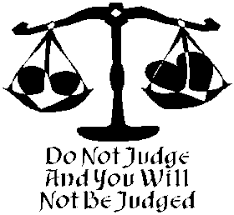Judge Not
A fourth principle of a righteous intermediate judgment of a person is that we should, if possible, refrain from judging until we have adequate knowledge of the facts. In an essay titled "Sitting in the Seat of Judgment," the great essayist William George Jordan reminded us that character:
cannot be judged as dress-goods—by the yard or so of sample unrolled from a bolt on the counter….One judges a painting by the full view of the whole canvas; separate isolated square inches of colour are meaningless. Yet we dare to judge our fellow man by single acts and words, misleading glimpses, and deceptive moments of special strain. From these we magnify a mood into a character and an episode into a life…
We have a right to our preferences, our likes and dislikes, our impressions, our opinions, but we should withhold final judgment—as an honest unprejudiced juryman keeps his verdict in suspense until he has heard and tested all of the evidence…
…We misinterpret motives, do not know facts, and judge from wrong standards.
(William George Jordan, "Sitting in the Seat of Judgment," The Crown of Individuality, 1909, pp. 101-5)
In another essay, William George Jordan wrote:
There is but one quality necessary for the perfect understanding of character, one quality that, if a man have it, he may dare to judge—that is, omniscience. Most people study character as a proof-reader pores over a great poem: his ears are dulled to the majesty and music of the lines, his eyes are darkened to the magic imagination of the genius of the author; that proofreader is busy watching for an inverted comma, a misspacing, or a wrong font letter. He has an eye trained for the imperfections, the weaknesses….
We do not need to judge nearly so much as we think we do. This is the age of snap judgments….We need the courage to say, "I don't know. I am waiting further evidence. I must hear both sides of the question." It is this suspended judgment that is the supreme form of charity.
("The Supreme Charity of the World," The Kingship of Self-Control, p. 27-30)
Someone has said that you cannot slice cheese so fine that it doesn't have two sides.
I heard President James E. Faust say: "The older I get, the less judgmental I become."
